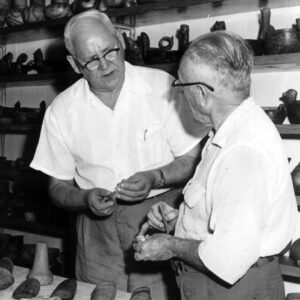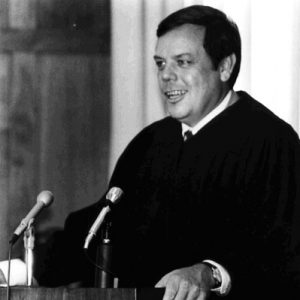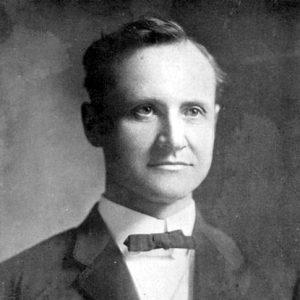calsfoundation@cals.org
Teaching of Evolution
Few educational issues have caused as much vehement debate in Arkansas as the teaching of evolutionary theory—the scientific proposition that species change, or evolve, over time, primarily through the mechanism of natural selection. Books and articles have been written, laws passed, sermons delivered, and trials held, with the defenders and the critics of the teaching of evolution united only in their belief that the handling of this subject in Arkansas classrooms was a matter of the gravest importance. Passions and tempers remain high even into the twenty-first century.
By the late nineteenth century, many people in Arkansas, indeed all over America, were becoming increasingly disturbed by modernization, with its sweeping changes in the way people lived and thought. These changes brought an increasing secularization of society, which biblical fundamentalists, especially, attributed to the dissemination of the theory of evolution as articulated by English naturalist Charles Darwin (1809–1882) in The Origin of Species (1859). Religious thinkers such as the Reverend Benjamin Marcus Bogard, one of Arkansas’s most influential clergymen, rejected this theory as flatly contradictory to scripture and argued that evolution demoted human beings from their exalted status as God’s children to merely another animal, sharing ancestors with, most closely, the apes. Bogard’s stance is well expressed in the title of a sermon he gave in 1928: “Man or Monkey, Which?”
In Arkansas, a belief in the literal truth of the Bible remained a powerful force. The holders of this view, convinced that the belief in evolution was an evil, were determined to prevent its teaching in Arkansas schools. As Bogard put it, “If our children are taught that they are only developed animals, they will live as animals. The morals of the barnyard will result.” Opponents of evolution in Arkansas were inspired to act by Tennessee’s law forbidding the teaching of evolution, upheld in 1925 in the famous “Scopes Monkey Trial.” In 1927, they submitted a bill to the Arkansas legislature to ban the teaching of evolution in the state’s publicly funded schools, including colleges and universities. Those who accepted the theory of evolution, including several prominent religious leaders, mounted a successful opposition, and the bill went down to defeat.
Undaunted, the anti-evolutionists managed to get their bill on the ballot in the 1928 election as an initiated act. Despite strong opposition by university professors and other noteworthy intellectuals, the act passed with sixty-three percent of the vote. Legislation was introduced in 1937, 1959, and again in 1965 to overturn the law, but all these attempts failed.
No one was ever actually charged with breaking the 1928 anti-evolution law, raising questions about how strictly it was followed by the state’s biology teachers. Private schools were exempt. John Hugh Reynolds, president of Hendrix College, a private Methodist school in Conway (Faulkner County), fought against the law, and Hendrix continued to teach evolutionary theory openly. Defiance also continued at public institutions of higher learning. At the University of Arkansas (UA) in Fayetteville (Washington County), Professor Sam Dellinger had been teaching an anthropology course based upon the idea of evolution. He, along with four other Fayetteville professors, signed an American Association of University Professors (AAUP) resolution condemning the law, and Dellinger continued to teach his course.
In the 1950s, science education became a matter of national concern. The Cold War was raising fears that the Soviets were leaping ahead of the United States in science, particularly after the Soviets launched Sputnik, the first earth satellite, in 1957. One result was a federal Biological Sciences Curriculum Study, which strongly recommended that evolution be made the central focus of the study of biology at all levels. New biology textbooks were written reflecting this view and were adopted in many states.
Encouraged by these developments, Arkansas proponents of evolution renewed their struggle against its exclusion from the state’s public schools. In 1965, Susan Epperson, a high school biology teacher in Little Rock (Pulaski County), sued for the right to teach evolution. Though she lost in the Arkansas Supreme Court, she appealed, and in 1968 the U.S. Supreme Court struck down the 1928 anti-evolution law. It ruled unanimously in her favor on the grounds that the 1928 law violated the constitution’s insistence on separation of church and state.
It appears likely, though, that little actually changed in the state’s classrooms. A few biology teachers continued to cover evolution, as they had been quietly doing for years, while most continued to neglect it, either because of their own doubts or because they were afraid of angering their superiors.
By the 1980s, opponents of evolution had prepared a new line of attack. Realizing that the courts would throw out any law that was overtly based on religious beliefs, they brought forward the concept of “Creation Science.” This posited that evolution was merely one theory of how life had originated and developed. The creationists insisted that the scientific evidence, if correctly understood, would show that it was at least as likely that life on earth in all its present forms was the result of a sudden, and fairly recent, act of creation. Their adherents argued that creationism should thus be given time equal to evolution in the classroom. They differed from earlier opponents of evolution in that they claimed that their beliefs were in accord with scientific evidence as well as with the Bible.
In the spring of 1981, the Arkansas legislature passed—and the newly elected Republican governor Frank White signed—Act 590. This law mandated that equal treatment had to be given to Creation Science in schools if evolution was taught. On behalf of a number of adherents of evolutionary theory—including scientists, religious leaders, parents, and teachers—the Arkansas American Civil Liberties Union (ACLU) quickly filed suit against the new law. Their suit argued that the act was impermissibly vague, that it violated academic freedom, and, most importantly, that it violated the first amendment’s insistence on the separation of church and state. Creation Science, they maintained, was simply a fig leaf designed to cover what was in truth another attempt by the creationists to insert their own religious beliefs into Arkansas public school classrooms.
The trial, McLean v. Arkansas Board of Education, was held in Little Rock, beginning in December 1981, in the court of Judge William R. Overton of the federal District Court of Eastern Arkansas. It thrust Arkansas into the national and even global spotlight in a way unmatched since the desegregation of Central High School in the late 1950s. More than seventy news organizations, including several from overseas, sent reporters to cover the trial. Both sides saw the Arkansas law and the challenge to it as potentially crucial precedents in the wider struggle taking place in American culture.
Judge Overton’s opinion, issued in January 1982, was a wholehearted endorsement of the arguments of the ACLU and the defenders of evolution. Act 590, he determined, “was simply and purely an effort to introduce the Biblical version of creation into the public school curricula.” He struck down the law, thereby depriving Creation Science of its legal support in the classroom. In 1987, the U.S. Supreme Court reached the same conclusion in striking down Louisiana’s creationism law.
Despite these court rulings, Creationism, fueled by biblical literalism, has remained a strong force in Arkansas and has continued to influence the teaching of the sciences, particularly biology. Creationists in Arkansas have had sympathizers introduce new bills favorable to their cause into the state legislature. In 2001, for example, Republican representative Jim Holt co-sponsored a bill banning the purchase of texts covering evolution. It also required teachers to tell their students to write “false evidence” or “theory” in the margins of books already purchased wherever they discussed evolution. This was passed by a committee of the Arkansas House of Representatives before being defeated by the full House.
While creationists continue to work with the legislature, they have increasingly concentrated their efforts on a new approach, attempting to get sympathizers elected to local school boards and to influence textbooks, curricula, and teaching in various ways. In the Beebe (White County) school district, for example, creationists convinced the school board to add stickers to all of the biology texts. These stickers, several hundred words long, pointed out that many observers thought that an “intelligent designer” was necessary to explain life on earth. They told students that evolution was only one theory, not accepted by all scientists. The sticker apparently appeared for more than a decade before the threat of an ACLU lawsuit moved the Beebe School Board to have it removed in 2005.
Another option pursued by creationists has been to send their children to religiously oriented private schools that guarantee a biblically based education. The Liberty Christian School in Searcy (White County) explicitly claims on its website that its science teachers “present the universe as the direct creation of God and refutes [sic] the man-made idea of evolution. Evolution as a theory is explored and discussed, and we prepare students to understand (in age appropriate ways) how to defend Creationism scientifically against Evolution.”
Since Judge Overton’s 1982 ruling, the concept of evolution has been covered in the biology textbooks on the Arkansas Department of Education’s approved list and appears, though is not emphasized, in its Science Curriculum Framework. However, there is evidence that despite this, evolution continues to be minimized or even ignored in most of the state’s schools. Many science teachers quietly complain that—given the danger of provoking the anger of parents, administrators, and school board members—they teach little if any evolution. Others shy away from the subject because they themselves have never received the needed instruction on evolution. A survey of the state’s biology teachers conducted by state education officials showed that only fifty percent cover evolution at all, with most of those just glossing over it. The other fifty percent either ignore the subject completely or teach some form of creationism. This persisting situation has raised many questions about Arkansas’s commitment to giving its young people the best possible education in the biological sciences.
The state’s struggle over the teaching of evolution, it would appear, is far from over. Indeed, on March 6, 2017, Representative Mary Bentley filed House Bill 2050, which would amend the Arkansas Code “to allow public school teachers to teach creationism and intelligent design.” This bill did not go anywhere, but she followed up in 2021 with House Bill 1701, which again would allow teachers to teach creationism (the reference to intelligent design was dropped). HB 1701 was approved by the House Education Committee on April 6, 2021, and passed the Arkansas House of Representatives the following day by a vote of 71–21. On April 21, 2021, however, the Senate Education Committee turned back the bill.
For additional information:
Arthur, Allen. “Arkansas Teachers Avoided Evolution under Huckabee.” Washington Independent, January 23, 2008. Online at http://washingtonindependent.com/2560/arkansas-teachers-avoided-evolution-under-huckabee (accessed March 7, 2022).
Berumen, Britteny Nicole. “Comparing Public and Private High School Biology Teachers’ Acceptance and Teaching of Evolutionary Theory in Arkansas.” MS thesis, University of Central Arkansas, 2022.
Boatman, Misty Dawn. “Assessing Evolution Education in Public Schools in the State of Arkansas: Is the Light On?” MS thesis, University of Central Arkansas, 2022.
da Rosa, Jennifer A. “Twenty Years of Anti-Climate Change and Anti-Evolution Education Legislation in the United States.” Science Education 108 (2024). https://doi.org/10.1002/sce.21907 (accessed September 25, 2024).
Geisler, Norman. Creator in the Courtroom: Scopes II: The 1981 Arkansas Creation-Evolution Trial. Milford, MI: Mott Media, 1982.
Gilkey, Langdon. Creationism on Trial: Evolution and God at Little Rock. Minneapolis: Winston Press, 1985.
Gray, Virginia. “Anti-Evolution Sentiment and Behavior: The Case of Arkansas.” Journal of American History 57 (September 1970): 352–366.
Grunes, Rodney A. “Creationism, the Courts, and the First Amendment.” Journal of Church and State 31 (Autumn 1989): 465–486.
Halliburton, R. “The Adoption of Arkansas’ Anti-Evolution Law.” Arkansas Historical Quarterly 23 (Autumn 1964): 271–283.
Herzog, Rachel. “House Advances Bill to Let Schools Teach Creationism.” Arkansas Democrat-Gazette, April 8, 2021, p. 6A.
———. “Panel Advances Bill to Let Teachers Talk Creationism.” Arkansas Democrat-Gazette, April 6, 2021, p. 4A.
Howell, Cynthia. “District to Remove Stickers Doubting Evolution.” Arkansas Democrat-Gazette. February 11, 2005, p. 5B.
King, Kathryn. “Starting at the Beginning: Student Misconceptions about Evolutionary Theory as Assessed on the first Day of Class.” Journal of College Science Teaching 50 (May–June 2021): 41–46. Online at https://www.nsta.org/journal-college-science-teaching/journal-college-science-teaching-mayjune-2021/starting-beginning (accessed September 12, 2022).
LaFollette, Marcel, ed. Creationism, Science, and the Law: the Arkansas Case. Cambridge, MA: MIT Press, 1983.
Lancaster, Guy. “‘This Evolution Bit is Straight from Satan’: McLean v. Arkansas Board of Education and the Democratization of Southern Christianity.” Religion & Education 33 (Fall 2006): 69–89.
Ledbetter, Cal, Jr. “The Anti-Evolution Law: Church and State in Arkansas.” Arkansas Historical Quarterly 38 (Winter 1979): 299–327.
Lester, James E. Hendrix College: A Centennial History. Conway, AR: Hendrix College Centennial Committee, 1984.
Lewis, Todd. “Bogard’s Crusade: The War against Evolution in Arkansas, 1926–1928.” Ozark Historical Review 17 (Spring 1988): 1–18.
Mackenzie, Jim. “How Biology Teachers Can Respond to Intelligent Design.” Cambridge Journal of Education 40 (March 2010): 53–67.
Mainfort, Robert C., Jr. Sam Dellinger: Raiders of the Lost Arkansas. Fayetteville, AR: University of Arkansas Press, 2008.
Pruden, William. “Little Rock Cases at the U.S. Supreme Court: A Lesson beyond the Curriculum, Epperson v. Arkansas (1968).” Pulaski County Historical Review 71 (Spring 2023): 4–25.
Seidel, Andrew L. “Arkansas’s Creationism Bill Is Also Motivated by Anti-LGBTQ Bigotry.” Religion Dispatches, April 13, 2021. https://religiondispatches.org/arkansass-creationism-bill-is-also-motivated-by-anti-lgbtq-bigotry/ (accessed March 7, 2022).
Smout, Kary D. The Creation/Evolution Controversy: A Battle for Cultural Power. Westport, CT: Praeger, 1988.
Sweeney, Leo Thomas. “The Anti-Evolution Movement in Arkansas.” MA thesis, University of Arkansas, 1966.
Utter, Glenn H. Religious Belief and Science: A Reference Handbook. New York: Bloomsbury Publishing, 2024.
Wiles, Jason R. “Gifted Students’ Perceptions of Their Acceptance of Evolution, Changes in Acceptance, and Factors Involved Therein.” Evolution: Education and Outreach 7.4 (2014). http://www.evolution-outreach.com/content/7/1/4 (accessed March 7, 2022).
———. “The Missing Link.” Arkansas Times, March 23, 2006, pp. 10–12, 14–15. Online at http://www.arktimes.com/arkansas/the-missing-link/Content?oid=1013921 (accessed March 7, 2022).
Garrett L. McAinsh
Hendrix College











Comments
No comments on this entry yet.